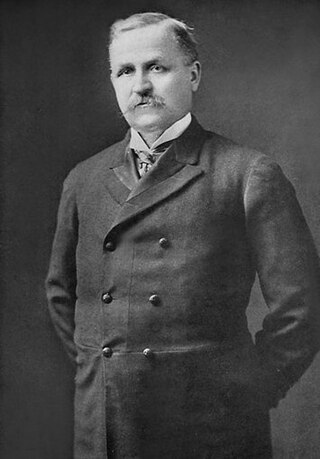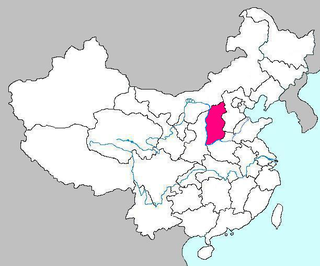
Arthur Henderson Smith was a missionary of the American Board of Commissioners for Foreign Missions noted for spending 54 years as a missionary in China and writing books which presented China to foreign readers. These books include Chinese Characteristics, Village Life in China and The Uplift of China. In the 1920s, Chinese Characteristics was still the most widely read book on China among foreign residents there.

In the early 19th century, Western colonial expansion occurred at the same time as an evangelical revival – the Second Great Awakening – throughout the English-speaking world, leading to more overseas missionary activity. The nineteenth century became known as the Great Century of modern religious missions.

Griffith John was a Welsh Christian missionary and translator in China. A member of the Congregational church, he was a pioneer evangelist with the London Missionary Society (LMS), a writer and a translator of the Holy Bible into the Chinese language.
The Church of England Zenana Missionary Society, also known as the Church of England Zenana Mission, was a British Anglican missionary society established to spread Christianity in India. It would later expand its Christian missionary work into Japan and Qing Dynasty China. In 1957 it was absorbed into the Church Missionary Society (CMS).

Since the arrival of Christianity in China, the Bible has been translated into many varieties of the Chinese language, both in fragments and in its totality. The first translations may have been undertaken as early as the 7th century AD, but the first printed translations appeared only in the nineteenth century. Progress on a modern translation was encumbered by denominational rivalries, theological clashes, linguistic disputes, and practical challenges at least until the publication of the Protestant Chinese Union Version in 1919, which became the basis of standard versions in use today.

The "China Martyrs of 1900" is a term used by some Protestant Christians to refer to American and European missionaries and converts who were murdered during the Boxer Rebellion, when Boxers carried out violent attacks targeting Christians and foreigners in northern China.

William Scott Ament was a missionary to China for the American Board of Commissioners for Foreign Missions (ABCFM) from 1877, and was known as the "Father of Christian Endeavor in China." Ament became prominent as a result of his activism during the Boxer Uprising and controversial in its aftermath because of the personal attacks on him by American writer Mark Twain for his collection of punitive indemnities from northern Chinese villages.
The Twain–Ament indemnities controversy was a major cause célèbre in the United States of America in 1901 as a consequence of the published reactions of American humorist Mark Twain to reports of Rev. William Scott Ament and other missionaries collecting indemnities from Chinese people in the aftermath of the Boxer Uprising.

The siege of the International Legations occurred in 1900 in Peking, the capital of the Qing Empire, during the Boxer Rebellion and led to the deaths of approximately 2500 Chinese people by western soldiers. Threatened by the Boxers—an anti-Christian, anti-foreign peasant movement—900 soldiers, sailors, marines, and civilians, largely from Europe, Japan, and the United States, and about 2,800 Chinese Christians took refuge in the Peking Legation Quarter. The Qing government took the side of the Boxers after the Eight-Nation Alliance invaded Tianjin at the Battle of the Taku Forts (1900), without a formal declaration of war. The foreigners and Chinese Christians in the Legation Quarter survived a 55-day siege by the Qing Army and Boxers. The siege was broken by an international military force, which marched from the coast of China, defeated the Qing Army, and occupied Peking.

Francis Dunlap Gamewell was a Methodist missionary in China. He was the chief of the Fortifications Committee in the Siege of the Legations during the Boxer Rebellion in 1900 and was acclaimed as one of the heroes of the siege.

The Northern Chinese Famine of 1876–1879 was marked by drought-induced crop failures and subsequent widespread starvation. Between 9.5 and 13 million people in China died mostly in Shanxi province, but also in Zhili, Henan and Shandong. The population reduction in censuses, which include famine migration, shows a drop of 23 million people, among which Shanxi lost 48%, Shaanxi lost 25%, Henan lost 22%. The drought began in 1875 and was influenced by the El Niño-Southern Oscillation.

The Oberlin Band was a group of Christian missionaries in China from Oberlin College in Ohio. Members of the Oberlin Band worked in Shanxi province from 1882 until 1900. During the Boxer Rebellion in 1900, the 15 missionary men, women, and children of the Oberlin Band were among the foreign missionaries executed by order of the provincial government or killed by Boxers and soldiers.
Cheng Jingyi or Cheng Ching-yi was a Chinese Protestant leader who worked for an independent, unified Chinese Christian Church and a nondenominational unity of Christians in China. He received honorary doctorates from Knox College, Toronto, Canada (1916); the College of Wooster, Ohio, USA (1923); and St. John's University, Shanghai (1929). He died in Shanghai after his visit to the mission work in southwest China and Guizhou in 1939.

David Z.T. Yui was a Chinese Protestant Christian leader who led the Chinese National YMCA. in the 1920s and 1930s.
The National Christian Council of China (NCC) was a Protestant organization in China. Its members were both Chinese Protestant churches and foreign missionary societies and its purpose was to promote cooperation among these churches and societies. The NCC was formed in 1922 in the aftermath of the Edinburgh Missionary Conference.

Sarah Luella Miner was an American educator and a Christian missionary in China from 1887 until her death in 1935. She founded and led the North China Union College for Women, China's first women's college.
The Denunciation Movement started on April 19, 1951, as a movement to rid the Christian church in China from foreign influence by denouncing and expelling foreign missionaries. It quickly spread, however, to include the arrest and imprisonment of popular Chinese Christian leaders, particularly evangelicals.

The Protestant mission began in the Chinese province of Sichuan in 1877, when premises were rented by the China Inland Mission in Chungking. However, it grew rather slowly, it was not until the late 1980s that Protestantism experienced rapid growth. The two largest denominations in the province before 1949 were Anglicanism and Methodism.
Elwood Gardner Tewksbury was a Protestant missionary of the American Board of Commissioners for Foreign Missions who served in China in the late nineteenth and early twentieth centuries.














